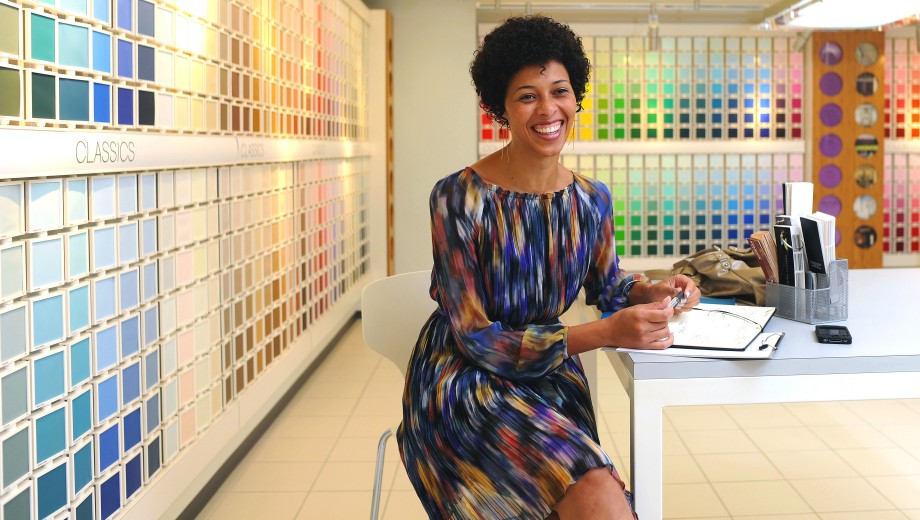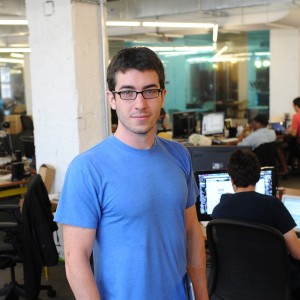“For many humanities students—and I put myself in this boat, too, initially—there seems to be a great divide between the humanities world and the business world,” says Starr Marcello, AM’07. A graduate of the Master of Arts Program in the Humanities (MAPH) with a focus on cinema and media studies, Marcello is now director of the Polsky Center for Entrepreneurship at the University of Chicago Booth School of Business.
The center seeks to encourage student entrepreneurship throughout the University, most notably by sponsoring business competitions. “Occasionally I work with humanities graduates, but it’s rare right now,” says Marcello. And that’s a shame, she adds, because “humanities students have a skill that makes them really valuable on a start-up team: being able to tell a story really well. In a start-up, you have to pitch your story over and over again to investors, advisers, customers.”
Tableau spoke with two entrepreneurs in Chicago who overcame that perceived divide between the humanities and business, putting their graduate studies to work in unexpected ways. Here are their stories.
Meghan Brown, AM’03, graduated with an architecture degree from Cornell in 1999 and worked in the architecture industry before earning her MAPH degree. She launched her interior design company, Occupi Design, in Chicago in 2007.
Poems about architecture: For my thesis, I wrote poetry about the experience of architecture in Chicago and about Chicago as a globalizing city. So I was the artist, writing the poetry, and then also the critic, looking at both the architecture and my own poetry through the lens of sociology.
"Be open to sharing your ideas," advises Brown. "Put it out there, just like in a discussion in class."
Recession timing: When I started my business, I just ended up diving right in. The business was the result of a few inquiries from people I knew. I thought, if they have work they would like to have done, let’s do it. Looking back, it was a crazy time.
Recession-proof: Staging and redesign—which is the moving of furniture and whatnot—is probably about 30 to 50 percent of my business, with remodels of kitchens, bathrooms, et cetera, being the remainder. If someone wants a new sectional, for example, I help them figure out if they really need a new sectional, or if we can move around a few pieces they already have and get the same or better effect.
Advice: There’s a certain amount of curiosity you have to have to be an entrepreneur and a humanities student. I would say, be open to any ideas, and be open to sharing your ideas—put it out there, just like in a discussion in class.
[wysiwyg_field contenteditable="false" wf_deltas="2" wf_field="field_article_images" wf_formatter="image" wf_settings-image_link="content" wf_settings-image_style="featured-img-landscape" wf_cache="1350663094" wf_entity_id="91" wf_entity_type="node"]
Matt O’Brien started the MAPH program in 2009 with a focus on philosophy and will finish his thesis this fall. Until recently, he was working 80 hours a week as CEO of SongLyrics.com, a website that earns $1 million in advertising revenues annually. He recently resigned to focus on a start-up of his own, Aletheia (Greek for “truth”), based at the 1871 technology hub in Chicago’s Merchandise Mart. Working with him is MAPH grad Clark Feusier, AM’12 (pictured with O'Brien above). The idea for the company, as improbable as it sounds, grew out of his philosophy thesis.
Wikipedia for opinions: Aletheia lets people collaboratively map arguments and the logical relations between ideas. It’s about seeing all sides of a controversial issue in one place. If Wikipedia is for facts, Aletheia is for opinions. In philosophy you’d say we’re trying to map logical space.
How it works: Imagine that you want to know something about the government in Iran. Wikipedia is a great place to go. But imagine that you want to figure out what the United States should do about a situation with Iran—this is where Aletheia steps in. Currently there is no central place for people to go to see all sides of any issue. We’re out to change that.
First steps: We competed in the Social New Venture Challenge run by the Polsky Center for Entrepreneurship. We got a lot of attention and interest from potential investors and people who might help us one way or another. Rather than go for funding, we decided to build the product, because there were still a lot of questions about whether this could be done. That’s where we’re at right now.
Why MAPH: When I started, my reasons weren’t as clear as they are in retrospect. As I went through the program, the project I wanted to work on also became a website. It was a happy outcome.
Advice for entrepreneurs: There’s no substitute for starting to do it. I would say, get going as soon as you can. Skip business school—you can read a few books. Take the money you would have put into business school and use that to start your business.
Humanities alumni have tapped their creativity to launch companies around the world. Trained as a sculptor at UChicago, John Kuhns, MFA’75, went on to launch a dual career in finance and energy—and recently published a semiautobiographical novel about it, China Fortunes. Zoka Zola, AM’09, who had a successful architectural practice in Croatia and Britain, took time out from her career to pursue humanities studies through MAPH before returning to her architectural practice in Chicago; her projects include her own modernist home, the award-winning Pfanner House.
What's your start-up story? Leave a comment below or send an e-mail to tableau@uchicago.edu.



Comments
Architecture and humanitiies
I'm an owner of a small firm EcoVidalDesign, Inc. and I know Meghan Brown from when she was an intern at the City of Chicago Department of Planning and Development. She was great working with us and always so enthusiastic and professional. I must say the humanities side is very important in architecture and urban planning. Understanding people and their wishes small (as your own house space) or big as your neighborhood and city are very important to create a sustainable world! Carmen Vida-Hallett, Principal EcovidalDesign